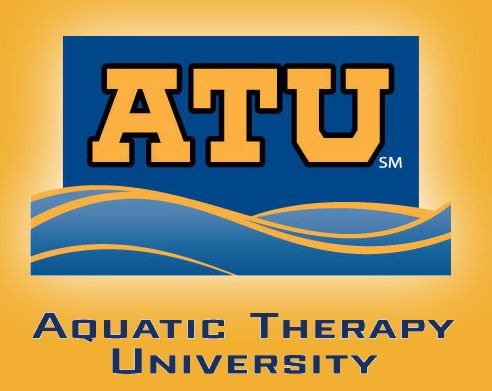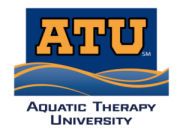
Sep 19
/
ATU Librarian
Why More Rehab Clinics Are Adding Aquatic Therapy — and How to Train Staff Fast
Ten years ago, many rehab clinics viewed aquatic therapy as a luxury — a “nice-to-have” feature if you happened to inherit a pool with your building lease. Fast forward to today: aquatic therapy has doubled in use across U.S. rehab facilities, with more clinics installing therapy pools or partnering with local YMCAs to offer water-based rehabilitation.
Why the surge? Simple. Patients want it, clinicians see the outcomes, and administrators notice the revenue stream. Aquatic therapy isn’t just splashing around — it’s an evidence-based extension of rehabilitation that gives clinics an edge in a crowded healthcare marketplace.
Why Clinics Are Jumping In
1. Patient Demand Is Skyrocketing
From aging Baby Boomers with arthritic joints to athletes rehabbing ACL repairs, patients are increasingly asking: “Do you have a pool?” Water offers a sense of safety and freedom, especially for those who fear falling or can’t tolerate land-based weight-bearing.
2. Evidence Backs It Up
Research consistently shows benefits across multiple populations:
Neurological rehab: aquatic therapy improves gait, balance, and confidence in stroke and Parkinson’s patients (Becker, 2020).
Orthopedic recovery: earlier weight-bearing in water reduces pain and accelerates ROM after joint replacement (Shariat et al., 2024).
Pediatrics: aquatic play and task-based exercises enhance motor planning in CP and autism (Fragala-Pinkham, 2014).
Chronic pain: aquatic therapy decreases central sensitization and offers graded exposure in a low-threat environment (Elnaggar, 2022).
3. It’s a Competitive Differentiator
Adding aquatic therapy sets your clinic apart. When a family chooses between two rehab providers and only one offers water-based care, the decision is often made before insurance paperwork is signed.
4. It Pays for Itself
With established CPT codes (97113 for Aquatic Therapy with Therapeutic Exercise), insurance reimbursement is straightforward. Clinics with aquatic programs often see increased patient retention and expanded referral networks.
The Clinical Advantages
The Clinical Advantages
If you’ve ever stood waist-deep in a therapy pool, you’ve already experienced the physics that make water such a powerful co-therapist:
Buoyancy reduces weight-bearing stress on joints, enabling earlier ambulation.
Viscosity provides 360° resistance — a built-in Theraband surrounding the patient.
Hydrostatic pressure reduces edema, improves circulation, and enhances proprioception.
Thermal properties relax spasticity and reduce pain.
Put simply: water gives us a clinical edge where land-based therapy alone hits limitations.
The Staff Training Gap
Here’s the catch: most PT, OT, and SLP programs barely skim the surface of aquatic therapy. New graduates may enter the workforce with stellar knowledge of gait training and neuromuscular re-education — but hand them a pool noodle, and they suddenly look like a deer in headlights.
Clinics that invest in pools without training staff risk ending up with a very expensive bathtub. Worse, improper aquatic handling can create safety risks for both patients and therapists.
How to Train Staff Fast
The good news? You don’t need to send your team back to grad school. Training can be streamlined, efficient, and hands-on.
1. On-Demand Training Modules
Clinicians are busy. Online aquatic therapy courses (like ATU’s Boot Camp and specialty webinars) let staff learn on their own time — evenings, weekends, or between patient blocks. Videos, manuals, and case-based quizzes reinforce knowledge without travel costs.
2. On-Site Staff Certification
Nothing replaces in-water practice. A short, intensive certification program brings instructors to your clinic pool, training your staff in safe transfers, progressions, and handling techniques. Staff leave with the confidence to immediately integrate aquatic interventions into daily care.
3. Blended Learning
The best model combines online content (theory, research, case studies) with on-site labs (practice, feedback, patient handling). Clinics that adopt blended training report faster uptake and fewer safety concerns.
4. Cross-Disciplinary Training
It’s not just for PTs. OTs, SLPs, CTRSs, and ATCs benefit when they understand how to integrate aquatic therapy into their discipline. Imagine an SLP using water play to stimulate breath control, or a rec therapist using aquatic games to build social skills. The pool becomes a team environment, not a silo.
Case Example: Training Done Right
One Midwest outpatient clinic invested in a SwimEx pool but hesitated to launch aquatic therapy because their staff felt unprepared. After enrolling ten therapists in ATU’s Aquatic Therapy Boot Camp, they launched a full program in eight weeks.
Results:
Referral volume increased by 30%.
Waitlist for aquatic sessions grew within two months.
Patient satisfaction surveys spiked, with one older adult writing, “For the first time in years, I felt safe walking without pain.”
The difference wasn’t the pool. It was the training.
Why Act Now
Healthcare is competitive. Patients shop for rehab services the way they shop for gyms, dentists, or restaurants. If your clinic doesn’t offer aquatic therapy, your competitor might.
More importantly: your staff already have the clinical reasoning. They just need the aquatic skill set. With structured, evidence-based training, they can go from hesitant to confident in weeks — not years.
Ready to bring aquatic therapy to your clinic?
“Adding aquatic therapy is no longer optional — it’s a competitive advantage.”
“A therapy pool without staff training is just an expensive bathtub.”
“Clinicians trained in aquatic therapy expand patient care and clinic revenue.”

We are an online educational platform that helps aquatic therapy providers to succeed in their professional goals.
Water-based rehabilitation belongs to multiple professions- whether you're PT, PTA, OT, OTA, SLP, TRS, or other healthcare providers, we have something for you.
Water-based rehabilitation belongs to multiple professions- whether you're PT, PTA, OT, OTA, SLP, TRS, or other healthcare providers, we have something for you.
Featured links
Connect with us
Copyright © 2025
(865) 204-0618
info@atuseminars.com
(865) 204-0618
info@atuseminars.com
